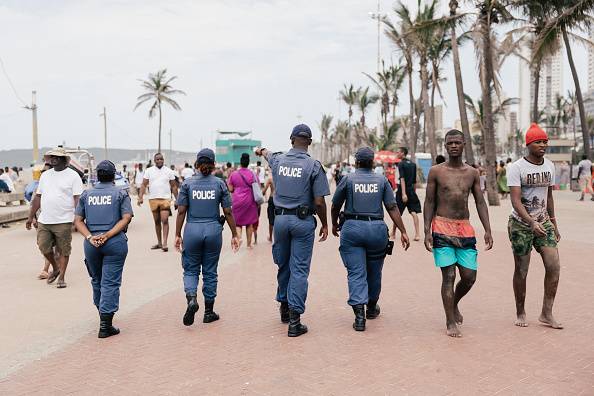LEXINGTON, Ill. — For the first time this election season, the two main candidates for Illinois governor Wednesday appeared back-to-back at a downstate agriculture forum, where Republican Darren Bailey still highlighted crime in Chicago and Democratic Gov. J.B. Pritzker tried to demonstrate he could still connect with farmers despite lacking a rural background.
Amid a backdrop of cornfields and wind turbines on a farm 120 miles south of Chicago, Bailey slammed violence in the city as he has repeatedly done throughout the campaign.
“The things that need to change are the fact that the city of Chicago has become the O.K. Corral with shootouts and homicides every night because people don’t feel safe,” Bailey told a crowd of about 100 people, many of them farmers during the forum in rural McLean County. “It’s real. Especially on the South Side where they’re being ignored.”
It was the latest negative moniker Bailey, the downstate farmer from Xenia, has given to Chicago after repeatedly referring to it as a “hellhole,” most recently during last week’s Illinois State Fair in Springfield.
Bailey’s comments about Chicago have previously drawn the ire of Pritzker and other Chicagoans. On Wednesday, Pritzker said Chicago remains a critical resource for the whole state, an issue he said he discusses with voters no matter where he goes.
“I believe that it’s the obligation of the governor to serve everyone in the state,” Pritzker said. “I talk about downstate Illinois when I’m in Chicago and I’m not afraid to come here and talk to you about Chicago, and the importance of, you know, it’s an economic engine for the state. Let’s make sure they’re thriving and let’s make sure that people across the state are thriving.”
Speaking before a group of fellow farmers would seem to have given Bailey a bit of a home-court advantage. The state senator on the campaign trail has repeatedly hammered Pritzker — the billionaire businessman and an heir to the Hyatt Hotel fortune — as an entitled politician who doesn’t have an understanding of middle-class or blue-collar Illinoisans.
Bailey tried to play into that edge by saying “it’s time that we had a farmer in the Governor’s Mansion so we can get our state growing again.”
Following Bailey’s speech, Pritzker addressed his lack of rural experience head-on and subtly dismissed claims he can’t connect to everyday residents.
“Look, I’m not going to pretend to be a farmer. I’m not. But I do know that agriculture is a business,” Pritzker said. “And before I was governor, I was a businessman with 10,000 employees, moving pallets around the country, producing packaging for consumer goods, developing technology to make production more efficient and lower costs for consumers.”
While the Agriculture Legislative Roundtable was meant to focus on agriculture policies, the two candidates also spoke individually on issues ranging from the state budget and pension payment obligations to the use of broadband technology.
:quality(70)/cloudfront-us-east-1.images.arcpublishing.com/tronc/S5IXGEAP4JDSDMPAKLRFMK7UBA.jpg)
Addressing plans by the state to invest more in broadband technology, Bailey noted it was important because rural areas don’t have as much internet access as urban areas.
“That is a problem because we’re farmers,” he said. “We’ve got to be efficient.”
The discussion also drifted into sweeping energy reform legislation signed by Pritzker last year that aims to put the state on a path to 100% carbon-free energy by 2050. By and large, coal plants would have to shut down by 2030, while natural gas plants would have until 2045.
The legislation also seeks to boost the development of wind and solar energy across the state and put more electric vehicles on the road.
Bailey told the crowd that Pritzker’s energy bill, which he opposed as a state senator, “wasn’t well thought out.”
“I have no problem with wind energy. I have no problem with solar energy. But we’re not there yet. We need to continue to ease into that because if we’re going to attract industry, if we’re going to attract more business, we’ve got to have the power to supply. And right now we don’t have that,” he said.
Pritzker acknowledged that his administration’s aspirations for changes in the state’s traditional energy infrastructure won’t happen overnight.
“I’ve been encouraging biofuels in the state of Illinois. Yes, we are going to see a gradual electrification of transportation in our state. But it is going to take a long time,” Pritzker said.
Also attending the forum were the two main candidates for U.S. Senate — Democratic incumbent Tammy Duckworth, who is seeking a second six-year term, and Republican challenger, Kathy Salvi.
Duckworth agreed with Pritzker’s comments about energy, saying biofuels are still “critically important,” especially on a global scale.
“Even if we transition away from combustion engines for vehicles in this country, other nations are still burning coal, they still have regular vehicles and I want us to be in a position where they’re buying their ethanol and their biofuels from the United States,” Duckworth told the crowd. “That market is going to be there for many, many (years) to come.”
Salvi told reporters after she addressed the crowd that she supports an “all-of-the-above energy program” that would look at the role of renewable energy sources. But asked about the role of electric energy in the future, which has been championed by Democrats, she said “not everybody can afford to go electric.”
“Right now we’re not ready to step into a … clean, green energy policy,” said Salvi. “It’s hurting Illinois and it’s hurting America.”
jgorner@chicagotribune.com










:quality(70)/cloudfront-us-east-1.images.arcpublishing.com/tronc/5TQZGLKVKVDAHESTVU35YFIP5Q.png)





Discussion about this post